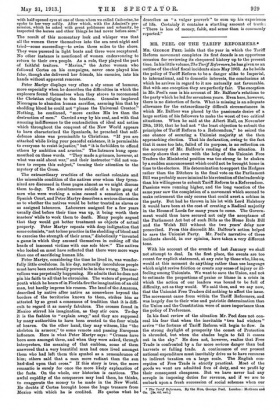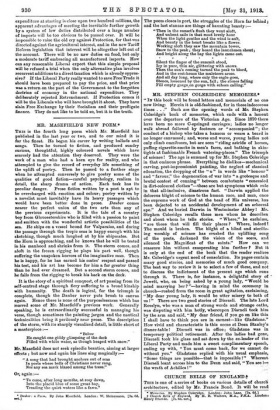MR. PEEL ON THE TARIFF REFORMERS.•
Ma. GEORGE PEEL holds that the year in which the Tariff Reform movement completes its first decade is an opportune occasion for reviewing its chequered history up to the present time. In his little volume, The Tariff Reformers, he has given us an outline of the chief fiscal incidents since May 1903. As be holds the policy of Tariff Reform to be a danger alike to Imperial, to international, and to domestic interests, the conclusions at which he arrives in regard to it are naturally not favourable. But with one exception they are perfectly fair. The exception in Mr. Peel's case is his account of Mr. Balfour's relations to the party which he led for seventeen years. Even here, however, there is no distortion of facts. What is missing is an adequate allowance for the extraordinarily difficult circumstances in which Mr. Balfour was placed by the passionate desire of a large section of his followers to make the worst of two critical situations. When he said at the Albert Hall, on November 29th, 1910, that he bad not "the least objection to submit the principles of Tariff Reform to a Referendum," he seized the one ohance of securing a Unionist majority at the then approaching election. That his declaration, owing to the fact that it came too late, failed of its purpose, is no reflection on the accuracy of Mr. Balfour's reading of the situation. It merely shows that even with the help of the Unionist Free Traders the Ministerial position was too strong to be shaken by a sudden announcement which could not be brought home in time to the electors. His determination to support the Hedgers rather than the Ditchers in the final vote on the Parliament Bill was probably more inimical to his retention of the leadership than his willingness to submit Tariff Reform to a Referendum. Passions were running higher, and the long vacation of the same year saw the completion of a movement which seemed to make retirement the only course that could avert a schism in the party. But had he thrown in his lot with Lord Halsbury it would have been at the cost of creating a Radical majority in the House of Lords for many years to come. The Govern- ment would thus have secured not only the acceptance of the Parliament Act but of such Bills as the Home Rule Bill and the Welsh Bill without the two years' delay now prescribed. From this discredit Mr. Balfour's action helped to save the Unionist Party. Mr. Peel's narrative of these incidents should, in our opinion, have taken a very different tone.
With his account of the events of last January we shall not attempt to deaL In the first place, the events are too recent for explicit statement, at any rate by those who, like us, would at this moment do anything rather than use language which might revive friction or create any sense of injury or ill- feeling among Unionists. We want to save the Union, and not to estimate the proportions of praise or blame in a crisis in which the action of our leaders was bound to be full of difficulty, act as they would. We said then, and we say now, that the Unionist Free Traders did nothing to affect the issue. The movement came from within the Tariff Reformers, and was largely due to their wise and patriotic determination that the Union and the Constitution were of more importance than the policy of Preference.
In his final review of the situation Mr. Peel does not con- ceal his fear that when the inevitable "two bad winters" arrive " the fortune of Tariff Reform will begin to flow. In the strong daylight of prosperity the comet of Protection is shrouded, but when the shades begin to fall it comes out in the sky." He does not, however, realize that Free Trade is confronted by a far more serious danger than bad harvests or falling trade. A continuance of our present national expenditure must inevitably drive us to have recourse to indirect taxation on a large scale. The English con- ception of Free Trade is strictly practical. Most of the goods we want are admitted free of duty, and we profit by their consequent cheapness. But we have never bad any scruple in imposing duties for revenue, and if we are to embark upon a fresh succession of social schemes when our • The Tariff Reformers. By the lion. George Peel. London : Methuen and Co. [2s. 6d. net.] expenditure at starting is close upon two hundred millions, the apparent advantages of meeting the inevitable further growth by a system of low duties distributed over a large number of imports will be too obvious to be passed over. It will be impossible to raise the old cry against Protection, for that was directed against the agricultural interest, and in the new Tariff Reform legislation that interest will be altogether left out of the account. There will be no nsw duties on food, but only a moderate tariff embracing all manufactured imports. How can any reasonable Liberal expect that this simple proposal will be refused a trial when the only alternative plan involves recurrent additions to a direct taxation which is already oppres- sive ? If the Liberal Party really wanted to save Free Trade it should have been prepared to pay the price, and that price was a return on the part of the Government to the forgotten doctrine of economy in the national expenditure. They deliberately rejected Retrenchment. If Protection comes it will be the Liberals who will have brought it about. They have slain Free Exchange by their Socialism and their profligate finance. They do not like to be told so, but it is the truth.



















































 Previous page
Previous page